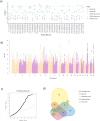Genome-wide multi-trait analysis of irritable bowel syndrome and related mental conditions identifies 38 new independent variants
- PMID: 37085903
- PMCID: PMC10120121
- DOI: 10.1186/s12967-023-04107-5
Genome-wide multi-trait analysis of irritable bowel syndrome and related mental conditions identifies 38 new independent variants
Abstract
Background: Irritable bowel syndrome (IBS) is a chronic disorder of gut-brain interaction frequently accompanied by mental conditions, including depression and anxiety. Despite showing substantial heritability and being partly determined by a genetic component, the genetic underpinnings explaining the high rates of comorbidity remain largely unclear and there are no conclusive data on the temporal relationship between them. Exploring the overlapping genetic architecture between IBS and mental conditions may help to identify novel genetic loci and biological mechanisms underlying IBS and causal relationships between them.
Methods: We quantified the genetic overlap between IBS, neuroticism, depression and anxiety, conducted a multi-trait genome-wide association study (GWAS) considering these traits and investigated causal relationships between them by using the largest GWAS to date.
Results: IBS showed to be a highly polygenic disorder with extensive genetic sharing with mental conditions. Multi-trait analysis of IBS and neuroticism, depression and anxiety identified 42 genome-wide significant variants for IBS, of which 38 are novel. Fine-mapping risk loci highlighted 289 genes enriched in genes upregulated during early embryonic brain development and gene-sets related with psychiatric, digestive and autoimmune disorders. IBS-associated genes were enriched for target genes of anti-inflammatory and antirheumatic drugs, anesthetics and opioid dependence pharmacological treatment. Mendelian-randomization analysis accounting for correlated pleiotropy identified bidirectional causal effects between IBS and neuroticism and depression and causal effects of the genetic liability of IBS on anxiety.
Conclusions: These findings provide evidence of the polygenic architecture of IBS, identify novel genome-wide significant variants for IBS and extend previous knowledge on the genetic overlap and relationship between gastrointestinal and mental disorders.
Keywords: Anxiety; Depression; Irritable bowel syndrome (IBS); Multi-trait genome-wide association study (MTAG); Neuroticism.
© 2023. The Author(s).
Conflict of interest statement
JARQ was on the speakers bureau and/or acted as consultant for Janssen-Cilag, Novartis, Shire, Takeda, Bial, Shionogi, Sincrolab, Novartis, BMS, Medice, Technofarma, Rubió and Raffo in the last 3 years. He also received travel awards (air tickets + hotel) for taking part in psychiatric meetings from Janssen-Cilag, Rubió, Shire, Takeda, Shionogi, Bial and Medice. The Department of Mental Health chaired by him received unrestricted educational and research support from the following companies in the last 3 years: Janssen-Cilag, Shire, Oryzon, Roche, Psious, and Rubió. ARU was on the speakers bureau and/or acted as consultant for Janssen-Cilag and Organon in tha last two years. All other authors declare no biomedical financial interests or conflicts of interest. JS has served as consultant for Noventure SL, Devintecpharma, Aboca, Reckitt, Ipsen and Pileje and discloses present and past recent scientific collaborations with Salvat, Norgine, Alfa-Sigma, Cosmo, Adare, Ordesa and Danone that do not constitute a conflict of interest in developing the content of the present manuscript. MS was on the speakers bureau and/or acted as consultant/advisory Board member for Tillotts, Menarini, Kyowa Kirin, Takeda, Biocodex, AlfaSigma, Sanofi, Janssen Immunology, Pfizer, Ferrer, BioGaia, Falk Foundation, Danone Nutricia Research, Ironwood, Genetic Analysis AS, DSM, Arena, Adnovate and Pharmanovia. He also was funded by Glycom/DSM research Grants.
Figures


Similar articles
-
Shared genetic architecture between COVID-19 and irritable bowel syndrome: a large-scale genome-wide cross-trait analysis.Front Immunol. 2024 Nov 15;15:1442693. doi: 10.3389/fimmu.2024.1442693. eCollection 2024. Front Immunol. 2024. PMID: 39620219 Free PMC article.
-
Unraveling the genetic susceptibility of irritable bowel syndrome: integrative genome-wide analyses in 845 492 individuals: a diagnostic study.Int J Surg. 2025 Jan 1;111(1):210-220. doi: 10.1097/JS9.0000000000002039. Int J Surg. 2025. PMID: 39166955 Free PMC article.
-
Investigating the shared genetic architecture of post-traumatic stress disorder and gastrointestinal tract disorders: a genome-wide cross-trait analysis.Psychol Med. 2023 Dec;53(16):7627-7635. doi: 10.1017/S0033291723001423. Epub 2023 May 23. Psychol Med. 2023. PMID: 37218628
-
Irritable bowel syndrome: relations with functional, mental, and somatoform disorders.World J Gastroenterol. 2014 May 28;20(20):6024-30. doi: 10.3748/wjg.v20.i20.6024. World J Gastroenterol. 2014. PMID: 24876725 Free PMC article. Review.
-
Of bowels, brain and behavior: A role for the gut microbiota in psychiatric comorbidities in irritable bowel syndrome.Neurogastroenterol Motil. 2021 Mar;33(3):e14095. doi: 10.1111/nmo.14095. Epub 2021 Feb 13. Neurogastroenterol Motil. 2021. PMID: 33580895 Review.
Cited by
-
The gut microbiome in disorders of gut-brain interaction.Gut Microbes. 2024 Jan-Dec;16(1):2360233. doi: 10.1080/19490976.2024.2360233. Epub 2024 Jul 1. Gut Microbes. 2024. PMID: 38949979 Free PMC article. Review.
-
Investigating shared risk variants and genetic etiology between Alzheimer's disease and three stress-related psychiatric disorders: a large-scale genome-wide cross-trait analysis.Front Aging. 2025 Feb 5;6:1488528. doi: 10.3389/fragi.2025.1488528. eCollection 2025. Front Aging. 2025. PMID: 39975850 Free PMC article.
-
The hidden genetic and microbial networks connecting neuropsychiatric and digestive disorders.Comput Struct Biotechnol J. 2025 Jul 16;27:3114-3126. doi: 10.1016/j.csbj.2025.07.029. eCollection 2025. Comput Struct Biotechnol J. 2025. PMID: 40703095 Free PMC article.
-
Integrating genetics and transcriptomics to characterize shared mechanisms in digestive diseases and psychiatric disorders.Commun Biol. 2025 Jan 14;8(1):47. doi: 10.1038/s42003-025-07481-6. Commun Biol. 2025. PMID: 39809838 Free PMC article.
-
Shared and Unique Genetic Links between Neuroticism and Gastrointestinal Tract Diseases.Depress Anxiety. 2024 Jun 21;2024:5515448. doi: 10.1155/2024/5515448. eCollection 2024. Depress Anxiety. 2024. PMID: 40226707 Free PMC article.
References
Publication types
MeSH terms
LinkOut - more resources
Full Text Sources

